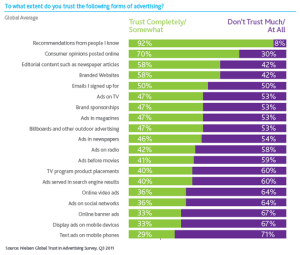If you are strolling through the city on a Saturday evening and you happen to notice that one bar has a line of people circling the block, you’ll probably assume that it’s one of the most happening spots in town. If a restaurant is booked up for reservations all week, or a particular movie at the theatre is sold out, your impression would be similar.
This effect is known as social proof, which Wikipedia defines as a “phenomenon where people assume the actions of others in an attempt to reflect correct behavior for a given situation.” The concept has wide-reaching implications in the field of human psychology, where it’s often viewed in a negative light (sometimes simply “going with the crowd” can lead to highly questionable decision-making) but in business it’s a critical aspect of brand building and customer acquisition.
 In the hyper-competitive world of the Web, where researching companies and products is easier than ever, social proof cannot be overlooked.
In the hyper-competitive world of the Web, where researching companies and products is easier than ever, social proof cannot be overlooked.
When the research company Nielsen polled consumers a few years ago about their views toward different forms of advertising, 70 percent responded that they trust consumer opinions posted online, second only to recommendations from people they know. Plenty of other studies have produced similar findings, and these statistics serve to illustrate the true power of social proof on the internet. Before making a purchase, shoppers want to know what others think, even when those “others” might be random and anonymous strangers.
Let’s take a look at some ways that you can make sure social proof is working FOR your business, and not AGAINST it:
Customer Reviews/Testimonials as Social Proof
We talked recently here about the value of online reviews for local SEO, but they’re also gold in terms of converting interested consumers. As the aforementioned statistic suggests, people put stock into what others have to say about their experiences with a particular service or product, and that can sometimes be the difference-maker in a purchase decision. So utilize the methods we recommended for soliciting positive reviews, and once you’ve got some, display them prominently on your site.
Case Studies as Social Proof
These aren’t the same as testimonials, because they aren’t coming from the customer himself/herself, but they’re the next best thing because they accomplish the same basic thing: Demonstrating the power of your product or service in action. With specific detail, explain how you helped a particular client or customer solve a problem and left them satisfied.
Social Media as Social Proof
Like it or not, the state of your social media channels says a lot to the online world about your company. If your Facebook and Twitter accounts are inactive, lacking a following, or – worst of all – non-existent, it will substantially ding your credibility in the eyes of consumers who are trying to learn more about you. Conversely, when a curious shopper peruses your social media accounts and finds that you’re present, active and responsive, it signals that you’re the kind of company they want to be in business with.
 If you have strong follower totals for Facebook, Twitter or other platforms, don’t hesitate to include a widget on your site’s sidebar or footer that shows them off.
If you have strong follower totals for Facebook, Twitter or other platforms, don’t hesitate to include a widget on your site’s sidebar or footer that shows them off.
User/Download Totals as Social Proof
This one’s fairly simple, but still effective. Depending on how you measure your business (number of products sold, number of clients, number of downloads, etc.), if it’s an impressive figure then promote it! Let people know how long you’ve been around and how many others have sought out your services. There’s a reason McDonalds proudly announces “Billions and Billions Served” on many of their signs. Here at Top Source Media, we’ve ranked more than a thousand sites on the first page of search results and we don’t mind sharing that fact.
Want to learn more about social proof and how to optimize its effectiveness on your website? We can help with that.
